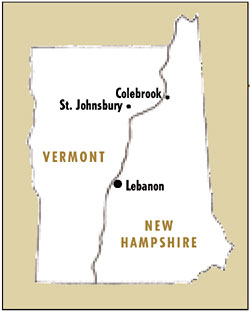Vital Signs
NCOC facility will bring cancer care to the patients
The northern reaches of Vermont and New Hampshire are scenic, but living there can be less than idyllic—especially for people with cancer. It can mean traveling two to three hours to get to Dartmouth's Norris Cotton Cancer Center in Lebanon, N.H., for treatments.
But the state of Vermont just approved a plan to build a comprehensive oncology center in St. Johnsbury, Vt., an hour and a half north of Lebanon. The North Country Oncology Center (NCOC), scheduled to open in 2005, is the result of a collaboration among eight hospitals, including Dartmouth-Hitchcock.
In his letter approving the project, John Crowley, commissioner of the Vermont agency that oversees health care, applauded the joint effort. "The collaborative approach utilized by DHMC in working through and developing a solution to a needed service . . . is commendable," he wrote.

|
Construction will begin this summer. The facility will be next to St. Johnsbury's Northeastern Vermont Regional Hospital (NVRH) and is expected to serve 114,000 residents in the two states. Although DHMC has provided outreach oncology services in the area for more than 20 years, patients who need radiation or chemotherapy or who are eligible for clinical trials have had to drive to Lebanon. About 95% of cancer patients in the NCOC area go to DHMC for treatment. Their average travel time is an hour and a half to two hours one way, with many protocols requiring daily treatments for up to six weeks. In some cases, patients have forgone treatment or opted for a more radical treatment rather than take on the physical, emotional, logistical, and financial challenge of daily trips to DHMC.
Unnerving: "Some patients are terrified of not being home when they are sick," explains Deanna Howard, DHMC's director of regional development and a key player in the collaboration. A native of Colebrook, N.H., and former CEO of Upper Connecticut Valley Hospital in Colebrook, she understands how unnerving it can be for people to travel great distances for cancer care. She drove one of her own relatives—who needed radiation five days a week for six weeks— to the Norris Cotton Cancer Center (NCCC) several times. It was three hours to DHMC and three hours back every day. "It brought home to me how far it was," says Howard.
With the new center, "people will have enhanced access to NCCC-level care closer to their communities and closer to their homes," says DHMC Vice President Susan Reeves. She estimates that over 200 patients will receive radiation therapy at the NCOC in its first year.
The new center will be staffed by nurses, receptionists, and pharmacists from NVRH and by two oncologists and one radiologist from Dartmouth. The physicians will also maintain ties with DHMC to stay up on the latest in cancer research and treatments. A few procedures— such as bone marrow transplants, radiosurgery, and brachytherapy— will continue to be available only in Lebanon because of the integration needed with other specialties. However, complex standard protocols and research protocols will be available at the NCOC. It will have one of the most advanced linear accelerators available—Intensity Modulated Radiation Therapy—for radiation treatments.
DHMC will be the legal owner of NCOC and will oversee its operation, but there will be an advisory board of representatives from the participating hospitals. The eight hospitals have also committed to raising part of the estimated $8.5 million to build and outfit the facility.
"As an NCI [National Cancer Institute]-designated Comprehensive Cancer Center, our goal has always been to deliver that top-notch treatment to our region, as close to the patient's home as possible," says Mark Israel, director of the NCCC.
"The North Country Oncology Center opens that same window of hope as when they live near a cancer center like Dartmouth's," notes Howard.
Laura Stephenson Carter
